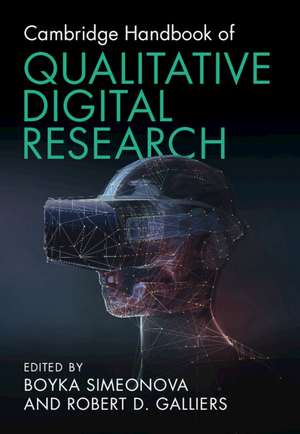Cambridge Handbook of Qualitative Digital Research
Editat de Boyka Simeonova, Robert D. Galliersen Limba Engleză Hardback – 21 iun 2023
Preț: 782.96 lei
Preț vechi: 1016.83 lei
-23% Nou
Puncte Express: 1174
Preț estimativ în valută:
149.82€ • 156.12$ • 124.05£
149.82€ • 156.12$ • 124.05£
Carte tipărită la comandă
Livrare economică 03-17 aprilie
Preluare comenzi: 021 569.72.76
Specificații
ISBN-13: 9781009098878
ISBN-10: 100909887X
Pagini: 500
Dimensiuni: 252 x 176 x 21 mm
Greutate: 0.71 kg
Editura: Cambridge University Press
Colecția Cambridge University Press
Locul publicării:Cambridge, United Kingdom
ISBN-10: 100909887X
Pagini: 500
Dimensiuni: 252 x 176 x 21 mm
Greutate: 0.71 kg
Editura: Cambridge University Press
Colecția Cambridge University Press
Locul publicării:Cambridge, United Kingdom
Cuprins
Part I. Philosophical, Epistemological and Theoretical Considerations: 1. Introduction: the need for qualitative research in the age of digitalisation Robert D. Galliers and Boyka Simeonova; 2. Philosophical perspective on qualitative research in the age of digitalization Allen S. Lee and Suprateek Sarker; 3. Data as a contingent performance and the limitations of big data Matthew Jones; 4. Big data: little understanding Rudolf A. Hirschheim and David Whitchurch; 5. Power, knowledge and digitalisation: a qualitative research agenda Boyka Simeonova and Robert D. Galliers; 6. Information technology and power Boyka Simeonova and M. N. Ravishankar; Part II. Methodological Considerations: 7. Human values in a digital-first world: the implications for qualitative research Hameed Chughtai and Michael Myers; 8. One picture to study one thousand words: visualization for qualitative research in the age of digitalization Hani Safadi, Marie-Claude Boudreau and Samer Faraj; 9. Demystifying the digital: a case for hybrid ethnography in IS Nicola Ens, Mari-Klara Stein and Tina Blegind Jensen; 10. Case study research revisited Boyka Simeonova and Guy Fitzgerald; 11. Social media qualitative research vignettes Alex Wilson, Josh Morton and Boyka Simeonova; 12. Co-inquiring in a digital age: enhancing the practice of strategy work in government organisations through action research Joe McDonagh, David Coghlan and Paul Coughlan; Part III. Illustrative Examples and Emergent Issues: 13. Observing artifacts: how drawing distinctions creates agency and identity Sven-Volker Rehm, Lakshmi Goel, and Iris Junglas; 14. Algorithms as co-researchers: exploring meaning and bias in qualitative research Wendy Arianne Günther, Mark Thompson, Mayur P. Joshi, and Stavros Polykarpou; 15. Sensemaking about HRV data of high performing individuals: crafting a mixed methods Study Stefan Klein, Stefan Schellhammer and Nathalie Mitev; 16. The rich facets of digital trace data Jonas Valbjørn Andersen and Philipp Hukal; 17. Balancing the momentum of datafication with qualitative researchers as design thinkers Gongtai Wang, Andrew Burton-Jones and Saeed Akhlaghpour; 18. What data sharing in government tells us about the digitalisation of government services: lessons from the UK digital economy act Edgar Whitley.
Descriere
This handbook highlights limitations of quantitative data analytics, promoting qualitative approaches (in tandem or separately) in analysing and understanding data.
